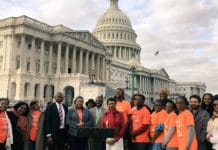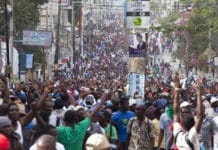by Tom Murphy
It has been four years since an earthquake devastated the small country of Haiti. More than three years have elapsed since a U.N. peacekeeping unit from Nepal introduced cholera to Haiti.
Despite telling CNN otherwise, the U.N. is not taking steps to ensure its peacekeepers do not carry cholera from country to country.

It came as a surprise when U.N. spokesman Farhan Haq told CNN in October that the U.N. was screening peacekeepers for cholera.
“Part of our lessons learned from this has been to screen peacekeepers for cholera,” said Haq.
It would be an important change in U.N. policy. But it is not true.
“No, that’s a bit of a misquote. I said that screening was something that had been considered. However, following WHO policy (which does not call for screening people for cholera if they’re asymptomatic), that was dropped,” said Haq to Humanosphere, via email.
The misquote on the CNN article remains unchanged. Haq did not respond to follow up questions regarding why the U.N. has not reached out to CNN about the mistake. We have been unable to confirm whether or not the U.N. reached out to the authors of the CNN article to correct the supposed mistake.
A U.N. task force raised questions about the efficacy of screenings and giving preventative drugs to staff in cholera-prone areas of the world.
“The use of antibiotics to prevent the spread of cholera has not been shown to be effective and may contribute to the emergence of antibiotic resistance,” explained Haq.
Despite telling CNN otherwise, the U.N. is not taking steps to ensure its peacekeepers do not carry cholera from country to country.
The U.N. continues to deny that it was the source of the outbreak. At present, it has failed to implement all the recommendations that its own panel determined could help prevent future incidents.
“The cholera outbreak in Haiti is a tragedy that cannot be undone, but that does not mean the U.N. cannot prevent epidemics like this in the future. The United Nations owes it to the people of Haiti and the world to carry out the life-saving, low-cost recommendations they made for themselves two years ago,” said Dr. Rishi Rattan, chair of Advocacy for Physicians for Haiti.
A report card by the Boston-based Physicians for Haiti said the U.N. has yet to implement three of the seven panel recommendations.
Two of the unresolved recommendations involve taking steps to ensure that peacekeepers do not carry cholera from one country to another. The U.N. can prevent the spread of cholera by its staff through screenings and prophylactic doses of antibiotics. In the case of Haiti, taking those actions could have saved thousands of lives by keeping cholera out of the country.
The two recommendations were not endorsed by the task force convened by the U.N. secretary-general, tasked with investigating the recommendations made by the panel. The lack of endorsement for screening asymptomatic carriers of cholera by the World Health Organization, a U.N. body, was used to refute the recommendation for screening. A lack of evidence gave cause to question the efficacy of antibiotics in preventing the spread of cholera.
The U.N. continues to deny that it was the source of the outbreak. At present, it has failed to implement all the recommendations that its own panel determined could help prevent future incidents.
Of the five endorsed recommendations, the U.N. has partially implemented two. The third recommendation, involving proper disposal of waste, has yet to be put into practice, says the Physicians for Haiti report card. Analysis by the NGO says that the unimplemented recommendations are not only effective, but should not require a significant additional cost for the U.N.
The independent panel of experts that found the U.N. was not at fault reversed course in May 2013. In an updated report, the four experts said the emergence of more evidence in the two years since they issued their initial report indicated that the strain of cholera was almost certainly not native to Haiti.
“The preponderance of the evidence and the weight of the circumstantial evidence does lead to the conclusion that personnel associated with the Mirebalais [U.N. Mission in Haiti] facility were the most likely source of introduction of cholera into Haiti … We would like to highlight here that we do not feel that this was a deliberate introduction of cholera into Haiti; based on the evidence we feel that the introduction of cholera was an accidental and unfortunate confluence of events.”
This story first appeared on Humanosphere. Tom Murphy is Humanosphere’s East Coast correspondent, a prolific writer-blogger and editor of the aid blog A View From the Cave. His work has appeared in Foreign Policy, the Huffington Post, the Guardian, GlobalPost and Christian Science Monitor. Tom is based in Boston and tweets at @viewfromthecave. Contact him at tmurphy@humanosphere.org.

 Store
Store











